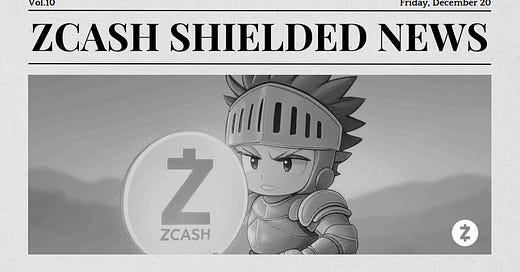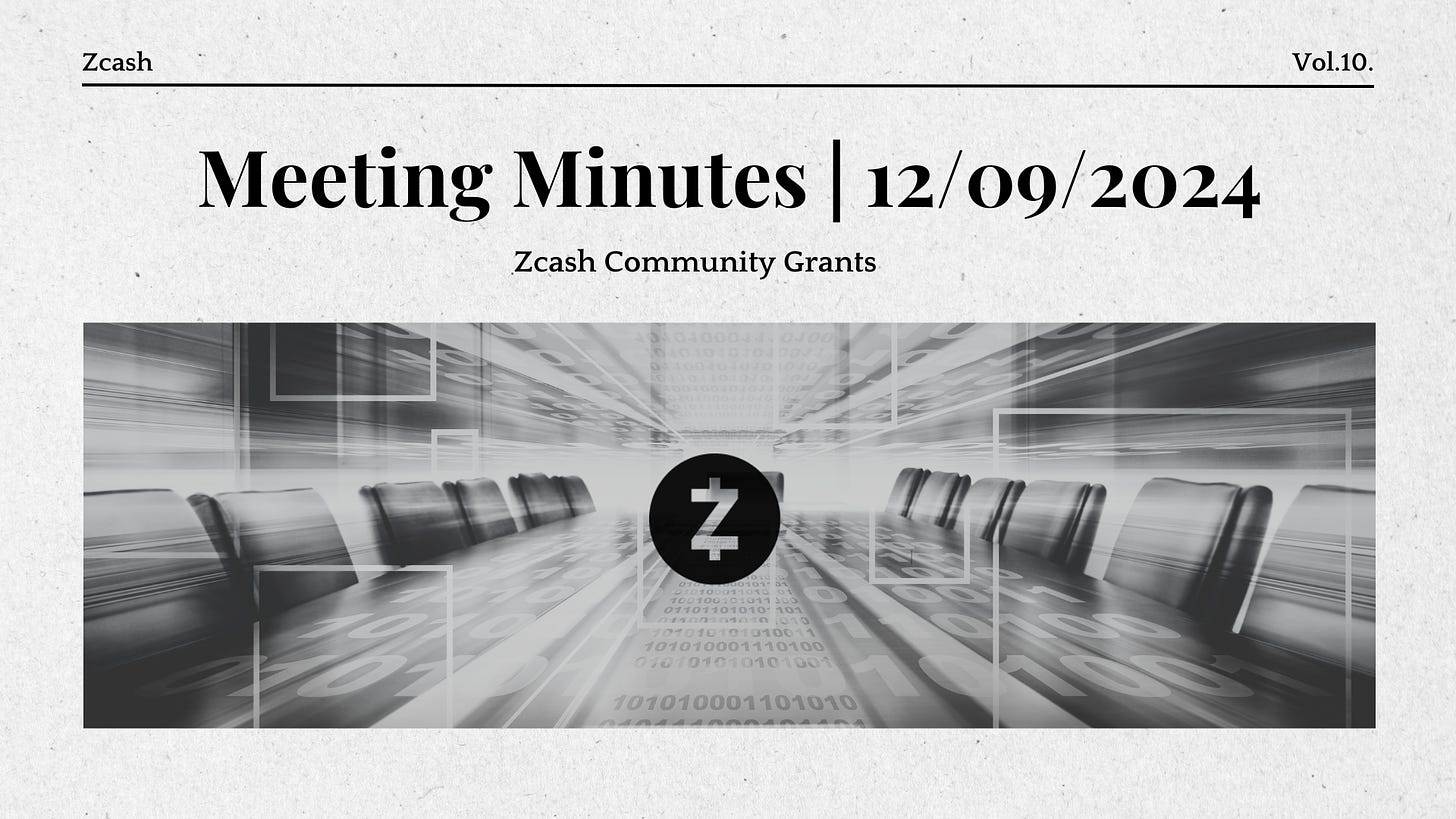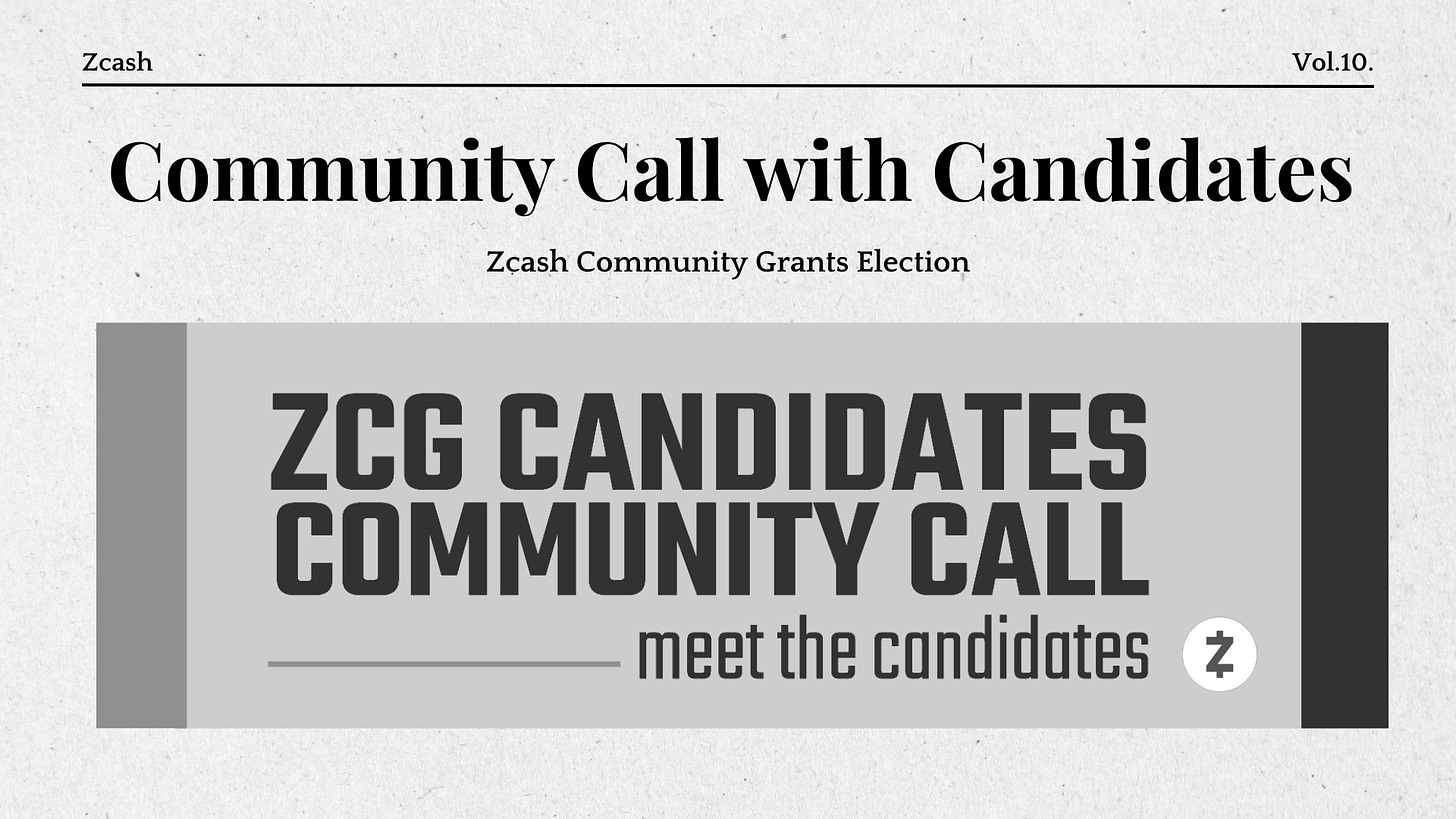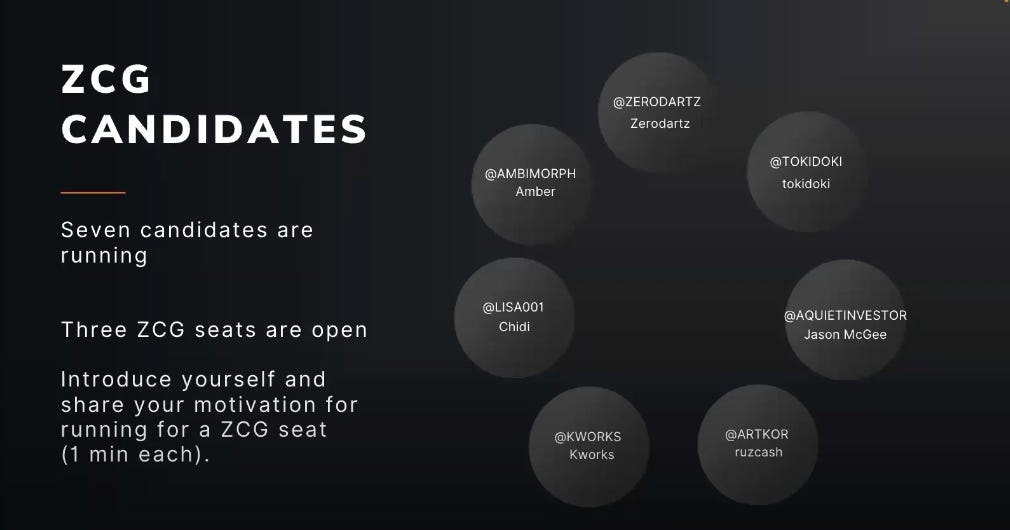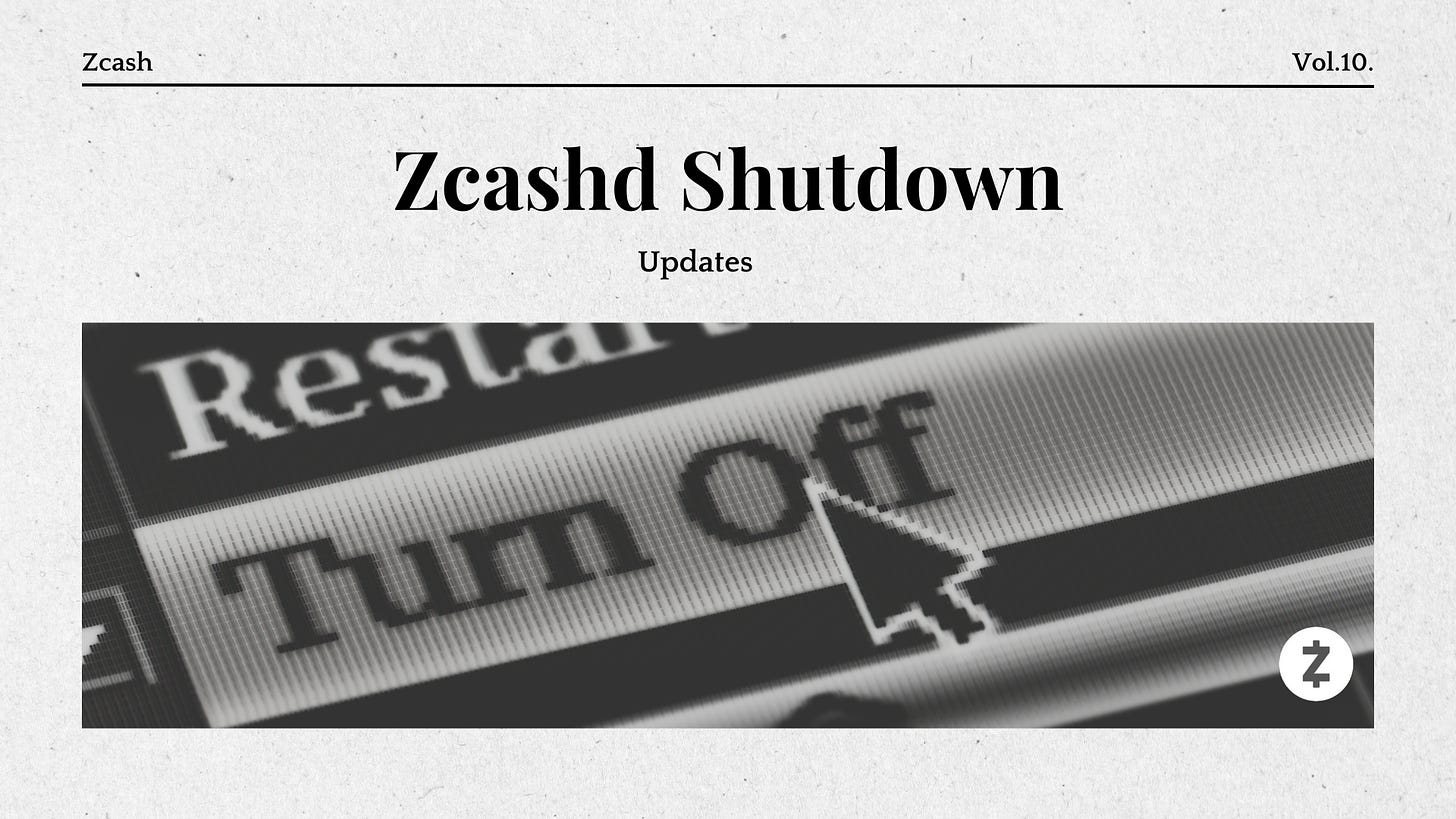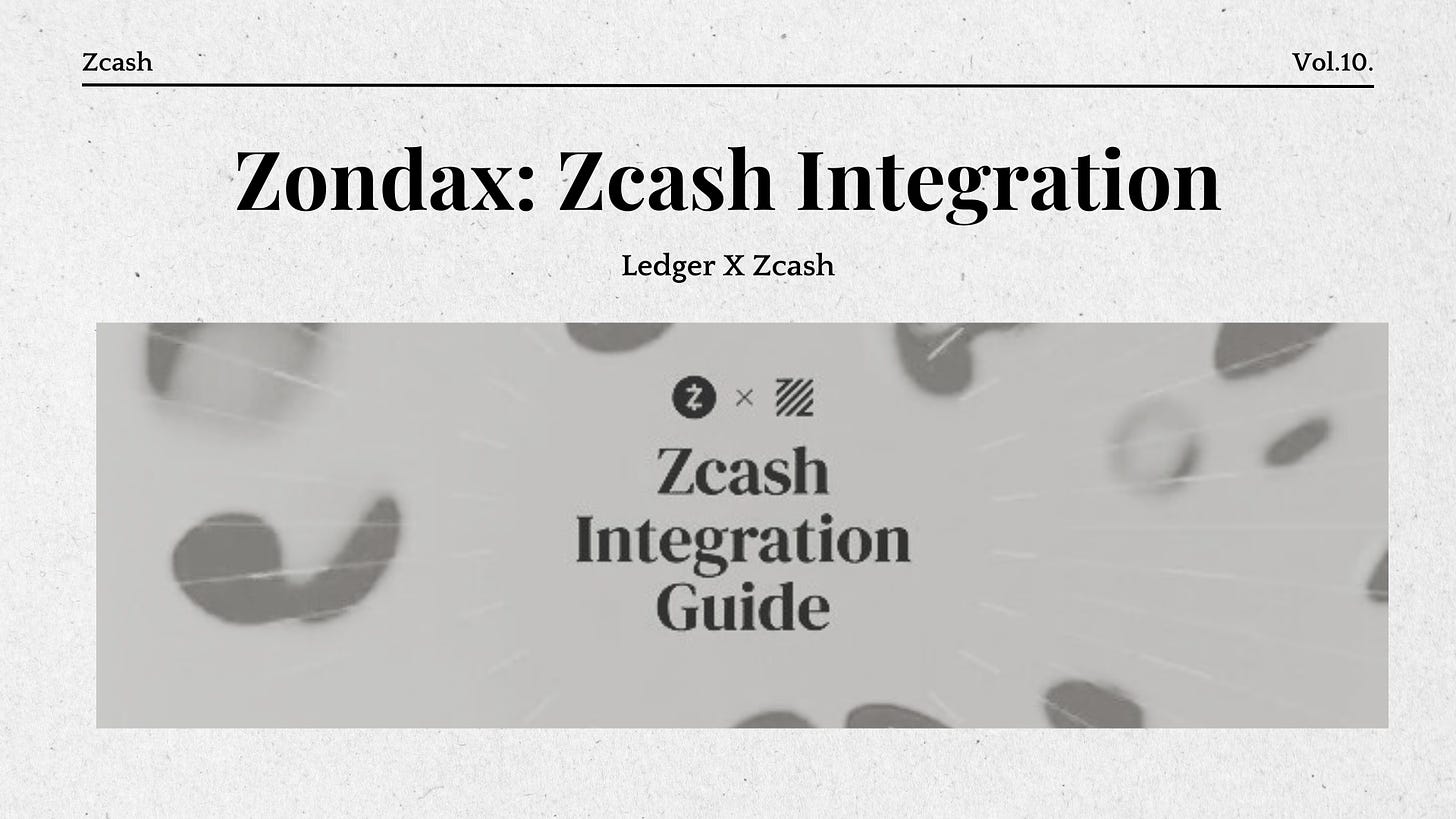Zcash Shielded News | Volume 10
Meeting Minutes: 12/09/2024, ZCG Community Call with Candidates, Zcash Deprecation: Updates & Zondax Updates: Zcash Integration
Zcash Shielded News is a community article format based on the weekly Zcash Ecosystem Digest Newsletter.
Providing insight on current events and informing the community about important news in the Zcash ecosystem.
Check out the best Highlights below
On December 9th, we attended one of the final meetings of the Zcash Community Grants (ZCG) with the current committee to review proposals submitted before the year's end.
Participants:
Amber
Brian
GGuy
Jason
Michael
Alex (FPF resource)
Deidra M (notetaker during the transition period)
1) Open Source Cash for Privacy & Simple Self-Custody ❌
This is a $50,000 proposal to develop an open-source solution called Open Source Cash, aiming to bring privacy, accessibility, and simple self-custody to Zcash using NFC tags.
The project seeks to create a mobile app and an open-source SDK to allow users to interact with Zcash via physical NFC tags, replicating the benefits of traditional cash in the digital world.
The funding would be used for developing the SDK, the mobile app, and conducting security audits, with a focus on privacy and ease of use. The goal is to integrate this solution into the Zcash ecosystem and make it accessible for developers to incorporate into wallets, exchanges, and dApps.
The ZCG unanimously voted to reject this proposal.
2) Bank-to-Zcash Gateway: A Secure Solution for On/Off Ramp ❌
Valued at $80,000, this proposal aimed to develop a secure and instant conversion solution between fiat currency and Zcash in Argentina, with potential expansion to Brazil.
The primary goal was to enable users to convert Argentine Pesos (ARS) into Zcash (ZEC) and vice versa without the need for intermediary exchanges, leveraging local banking systems for quick transfers.
The project included a mobile app or a Telegram bot as an MVP, with a target of supporting up to 30,000 transactions per month and plans for expansion to other exchanges.
Although promising for us in Latin America, Brian considered the proposal outside the scope, stating that ZCG had other priorities. GGuy, while encouraging such proposals, noted a lack of more detailed research. Finally, Jason agreed that the proposal was not viable at the moment, describing it more as a vague idea than a well-structured plan.
The proposal was unanimously rejected.
Note: The FPF conducted an initial regulatory review, and additional analysis would have been necessary if ZCG approved the funding.
3) Community Grants
The 2025 community grants programs and funding will be postponed by ZCG until the new committee is appointed.
The decision will likely be made during the January 20th meeting.
Some members shared their opinions on these community grants. Most expressed enthusiasm about implementing these projects in 2025.
Jason highlighted his admiration for the collaboration between core groups and the collective effort of the global Zcash community, stating his excitement to see the achievements of these teams next year.
On the other hand, Michael disagreed, stating that he does not fundamentally value grants aimed at online presence and community building. He also mentioned that some of the requested amounts are very high, even considering they cover activities for an entire year.
ZecHub 2025: An Education Hub For Zcash
Zcash Brazil 2025
Zcash Global en Español 2025
ZK AV Club Community Support
4) Brainstorming Session
Updates on GitHub Migration
The submission form is now available on the platform! The FPF and ZCG aim to start 2025 with the system fully operational. Currently, milestones are being processed outside GitHub to avoid payment delays.
ZconVI Poll (ZCG Topics)
Last week, Amber and Jason attended a meeting about ZconVI. Topics were prioritized through a Helios Poll, and the most voted ones to be addressed were:
Following this meeting, ZCG contacted Hahn, Kit & QEDIT to verify their potential participation in ZconVI. More updates will be available soon.
This Tuesday, we had the opportunity to get to know the new candidates for the Zcash Community Grants committee better during a Zoom call, which was livestreamed on Discord and later published on YouTube.
During the call, Alex (Host) and Elise (Slides) provided an opportunity for the seven candidates to introduce themselves, share their motivations, and elaborate further, each speaking for one minute.
The session was structured around six key questions:
Do you have a GitHub account, and have you ever completed a pull request (PR)? How do you personally feel about ZCG’s transition to GitHub?
Would you be open to hiring a ZCG Note Taker through a bounty, managed by ZecHub or FPF?
What should be ZCG's top priority for 2025?
Lockbox Governance: What should ZCG's role be in the governance of NU6-Lockbox and future governance post-lockbox?
Reflection on 2024: What was the best thing ZCG achieved last year? What could have been done differently or better?
Each question focused on how ZCG should operate and improve in the future. A variety of perspectives were presented, both distinct and interconnected.
Some candidates emphasized improving marketing and growth, while others prioritized development, aligning on the shared vision of playing a strong role in 2025 to ensure there is no uncertainty regarding governance and development heading into 2026.
Today, we’re sharing an important update on Zcashd. While many of us participate in the Arborist Calls, here’s what was accomplished this week as published by Pacu:
NU6:
The work has been completed, but some issues remain with certain wallets.
Exodus and Trust Wallet:
Both resolved their issues and will release fixes in the next update cycle.
Ledger:
Collaborating with the Zondax team to address a problem related to static values in the app.
Outreach:
Outreach efforts continue with more concise messaging and contributions from @alchemydc, supporting decentralized infrastructure.
Zebra:
The week was focused on resolving bugs.
Zaino (ZingoLabs):
Progress is being made to address issues with the Zebra Regtest.
Plans are in place to replace Lightwalletd at the beginning of 2025.
In-Memory Backend:
A long PR review is still ongoing.
Collaboration with ChainSafe is underway for integration with Metamask Snap.
Zcashd CLI Wallet:
Tight deadline for completion by the end of January.
Developers are being sought to contribute to RPC support.
Wallet Export Format (ZeWiF):
A proposal has been introduced for an extensible format to enable interoperability between wallets and tools for migrating legacy data.
The Zcash Shielded Application is now publicly available, but official support for Ledger devices in wallets like Ledger Live, Zingo, YWallet, and others remains absent—except for an experimental fork of ZecWallet developed by Zondax. This article outlines the steps for integrating support for the Ledger Zcash Shielded App into wallets, benefiting various solutions.
Overview of Zondax and Ledger Integration
1. Device Communication
Zondax provides communication libraries in Rust and JavaScript, utilizing the APDU protocol to interact with Ledger devices.
Private/sensitive keys are never shared outside the device; operations such as transaction signing must be executed directly on the hardware.
2. Integration Guidelines
Key Management (Keystore):
Implement a unified interface to manage keys, integrating the wallet's current system with the Ledger.
In Rust, it’s recommended to use an enumeration to abstract key management for both in-memory and Ledger-based keys.
Transaction Signing:
The signing process should be centralized in the Keystore.
Communication with the Ledger occurs in steps due to the device’s memory and computational limitations.
Example: Shielded/transparent inputs and outputs are processed sequentially, and cryptographic proofs (ZK proofs) are generated and signed within the device.
3. Commands and Functionalities
Supported Operations:
The Ledger provides methods for Sapling operations, including:
Retrieving public keys
Generating shielded addresses
Signing transactions
Address Types:
Transparent addresses: Can be retrieved without user confirmation.
Sapling keys:
Private keys remain within the device.
Public keys require user approval to be shared.
4. Limitations
UTXO Limitations: Maximum of 5 transparent inputs/outputs and 5 shielded inputs/outputs per transaction.
Unified Addresses and Orchard Protocol: Currently not supported; only Sapling transactions are processed.
5. Documentation and Testing
Comprehensive documentation and tests are available in the app's repository, including detailed integration flows and usage examples.
An emulator (speculos) is provided to verify the integration process with the Ledger before deployment.
